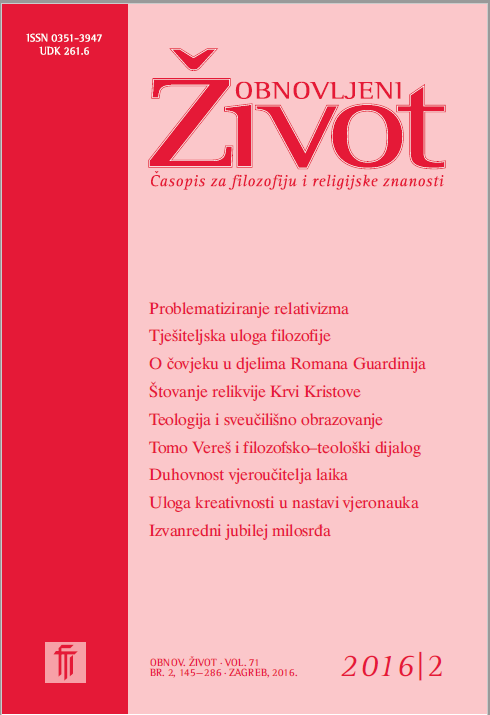The Role of Creative Competencies and Social Competence in Teaching Catechism
Keywords:
teacher competencies, Catechism, creative competencies, social competenceAbstract
In the context of teaching, competence is defined as a high level of professional expertise gained through quality schooling in the field of pedagogy and training attained at Teachers’ College and through continuing specialization courses. Creative competencies and social competence are of special significance in building supportive relationships with students and in the shaping of an effective teacher. They are wellsprings of motivation and a prerequisite for developing creativity in students and for constructive teacher–student communication. This relates especially to Catechism class, a subject which promotes the students’ integral development and education and also emphasizes personal, social, religious and universal human values. Therefore, the aim of this paper is to establish the level of self–assessment in the categories of social competence and creative competencies shown by secondary school Catechism teachers in the Republic of Croatia. Reasearch has demonstrated that 304 Catechism teachers assessed their aptitude by filling in a questionnaire titled Pedagogical– Competencies Profile of the Catechist. A significant difference between men and women was observed in their assessment of the importance of social competence, whereby women considered the latter to be of greater import than did men. No difference between the genders was found in their evaluation of the importance of creative competencies. The same was noted in regard to creative competencies and social competence concerning the type of school, duration of internship and participants’ status. The results obtained were examined in light of contemporary research on teacher competencies, the factors which determine them and their implications.
Downloads
Published
Issue
Section
License
Jednom prihvaćeni članak obvezuje autora da ga ne smije objaviti drugdje bez dozvole uredništva, a i tada samo uz bilješku da je objavljen prvi put u Obnovljenom životu. Uredništvo će obavijestiti autora o prihvaćanju ili neprihvaćanju članka za objavljivanje.
Članci objavljeni u časopisu se, uz prikladno navođenje izvora, smiju besplatno koristiti u obrazovne i druge nekomercijalne svrhe.


